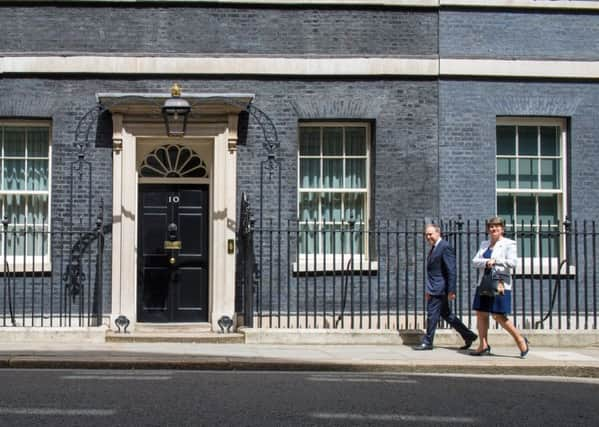Sam McBride: Major risks for DUP, as well as for Sinn Fein, in any form of direct rule


Sinn Fein, which had been confidently holding out for major concessions from the DUP, suddenly has found itself in a situation whereby if it continues to refuse to allow Stormont’s return it will ultimately be handing power back to an openly unionist prime minister propped up by the DUP.
For that reason, it would appear that Sinn Fein ultimately has far more to lose than the DUP if Stormont does not return. Joint authority, with Dublin and London sharing in the running of Northern Ireland, had already been explicitly ruled out even before the DUP arrangement.
Advertisement
Hide AdAdvertisement
Hide AdAnd it would become increasingly difficult to explain to ordinary nationalists why a refusal to accept Arlene Foster as first minister meant that Sinn Fein would hand over full control of Northern Ireland to a Tory government which Mrs Foster is propping up – particularly given that Sinn Fein’s refusal to take their Westminster seats makes it easier for the government to get its programme through the Commons.
Some rank and file DUP members (though not the MLAs, who stand to lose financially if Stormont does not return) are openly salivating at the prospect of direct rule, seeing it as a way to circumvent the constraints of power-sharing with Sinn Fein, while also punishing Sinn Fein for, as they see it, overplaying their hand with grandiose demands.
But developments in the Palace of Westminster yesterday might have sent something of a chill up the spines of some DUP members who have hitherto been relaxed about the prospect of rule from London.
By the simple act of tabling an amendment to the Queen’s Speech, a Labour backbencher, Stella Creasy, forced the government – in a matter of hours – into a significant policy announcement about funding abortions in England for those who travel from Northern Ireland.
Advertisement
Hide AdAdvertisement
Hide AdAbortion has long been a conscience issue for the major parties in the Commons meaning that there is no whip on the issue and there were rumours around Westminster that there may be sufficient numbers to pass the amendment.
Had that happened, the DUP would have been in a disastrous position.
Although the party would have opposed the amendment itself, once the amendment passed it would then have altered the text of the Queen’s Speech itself – which, under the terms of their confidence and supply deal with the Tories, the DUP was contracted to support. That would have seen the DUP voting for a Queen’s Speech which called for abortion funding.
No doubt aware of that potential scenario, the government moved rapidly to effectively concede what was in the amendment, leading to it being withdrawn.
Advertisement
Hide AdAdvertisement
Hide AdBut in that political drama are the seeds of many future problems for the DUP at Westminster, where it is clear that the party is far from popular – not just among the opposition parties, but also among plenty of Tories.
Direct rule with a unionist prime minister will be constitutionally more acceptable to the DUP. But it is clear that this prime minister is greatly diminished and therefore will not be able to fend off every attempt to get at her “friends and allies”, even were she so minded.
Fundamentally, the developments of recent weeks make a return to Stormont more likely, even if it is not for several weeks or months.
The secretary of state, looking dangerously weak after warning that there would be “profound and serious implications” to missing his deadline, now faces an immediate choice over whether to call a second snap Assembly election – which would almost certainly be to the DUP’s advantage – or continuing creeping direct rule by legislating for a Stormont budget, something which now has not been in place for almost three months.
Advertisement
Hide AdAdvertisement
Hide AdIf he does so, it may actually help spur on Sinn Fein to a deal.
There appears to be a significant segment of nationalist opinion which is firmly behind Sinn Fein’s hardline stance.
If a Tory budget for Northern Ireland is passed it would then allow Sinn Fein to say to those supporters that they have got some concessions in the talks but if they don’t return to Stormont then the reality will be direct Tory rule with significant DUP input.
And for the DUP, there is a very obvious risk in that scenario – budgets frequently attract mischievous amendments.